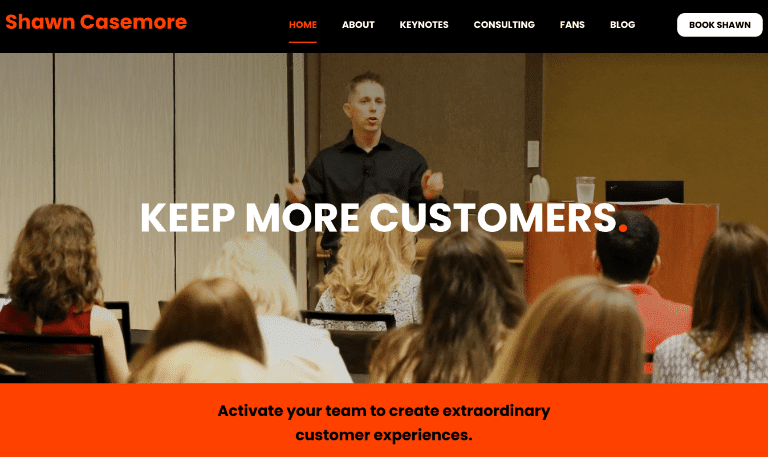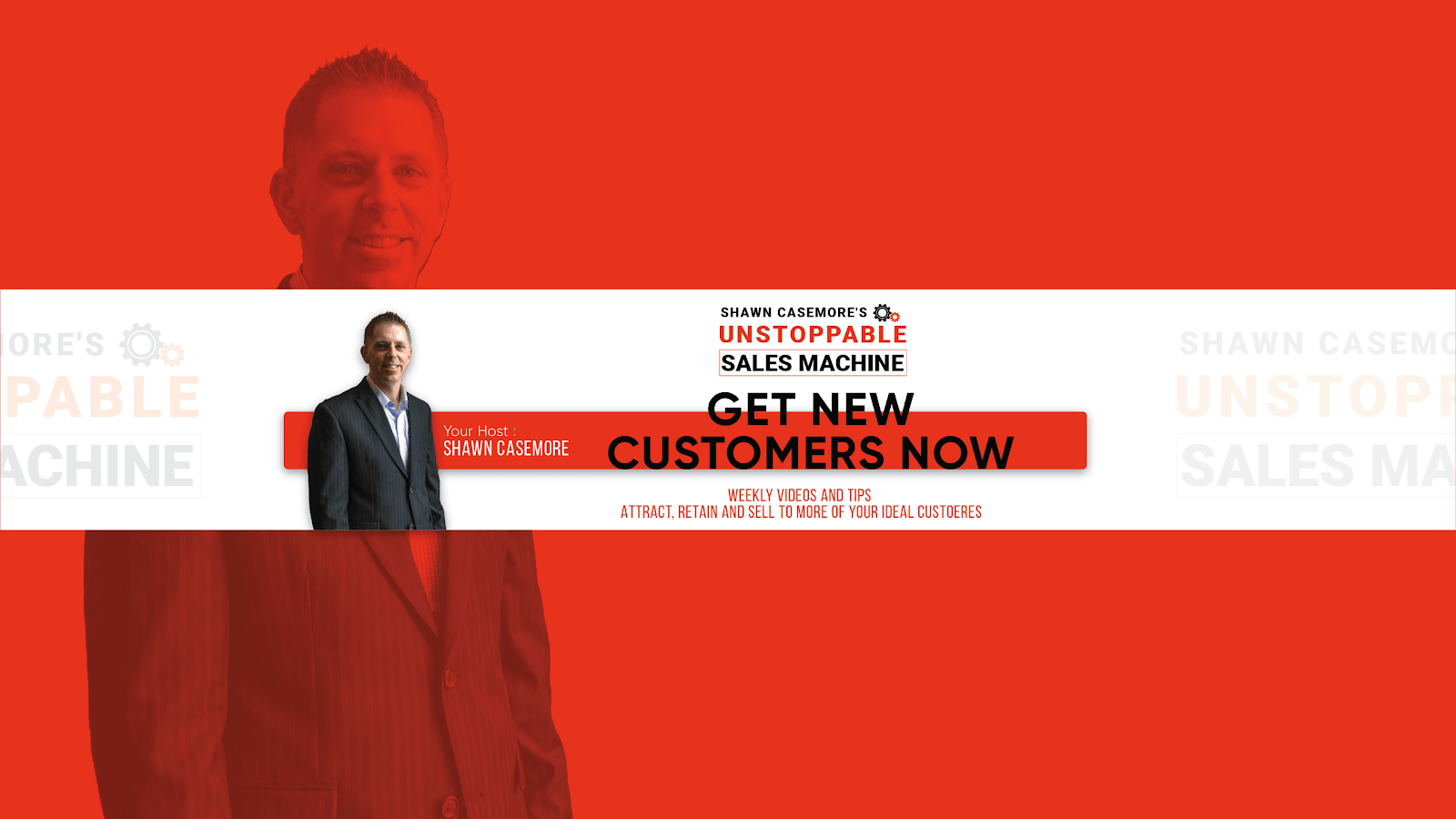Have you ever wondered how to get speaking engagements?
I’m not talking about ones that involve a toast at the end, like your cousin Martha’s wedding.
But real, “listen to what I have to say and pay me when I leave” speaking engagements.
Good news! You can.
Bad news? It’s not easy.
It takes work and often years of effort.
But if you put in the work, you can become a professional speaker and get paid to share your insights, ideas, and stories for a living.

How to Find Speaking Engagements (in 5 Steps)
1. Decide What You Want to Speak About
Speaking starts with having a message to share.
Unfortunately, if the message falls on deaf ears, your career will be short-lived.
To begin with, think about a topic you can speak about that you have experience in.
Have you led a team of people and have tips and ideas you can share? Do you have a technical skill like SEO and want to share the lessons you’ve learned?
Although the list for potential speaking topics can be long, generally all speakers fall under one of the following ten categories:
- Leadership
- Motivation
- Sales and Marketing
- Entrepreneurship
- Technology
- Customer Experience
- Teamwork
- Mental Health
- Communication
- Wellness
There are plenty of other categories, but most generally land within these ten.
Pick a Broad Topic to Start
Once you’ve identified a topic area that you can (and want!) to speak about, the next question is whether anyone wants to hear your message.
Ask yourself this question: “Would anyone pay to hear my message?”
If you’re not sure how to answer the question, look at other speakers who speak on the topic you’re considering.
Competition is good.
The more speakers who speak on your topic, the more likely your topic is in high demand.
2. Toot Your Own Horn: Develop Your Marketing Materials
Being a paid speaker and getting speaking gigs is all about marketing.
In the business, this is known as your speaking “platform”.
Most event planners, event organizers, and conference organizers search for speakers using Google. Hopefully, they’ll find your platform. And when they do, they’ll decide whether or not you’re a good fit for their event.
And even if they’ve heard you speak and like what you have to say, they’re still going to check out your platform and do their due diligence.
A good book on this topic is Michael Hyatt’s bestseller Platform: Get Noticed in a Noisy World (affiliate link), which discusses all of the various aspects of building your platform.
For our purposes, let’s keep it simple.
Your marketing platform will need to consist of three things (at a minimum):
- A professional-looking website
- A demo video of you speaking
- An online presence
Build Your Website
To begin with, take some professional photos of yourself and create a simple website.
Consider it your speaking resume of sorts.
A few pages such as “About”, “Speaking Topics”, and “Contact Information” are all you need to get started.
You can see a version of my speaking website here:

With a website in place, you’ll want to develop a demo video.
Producing Your Demo Video
If you haven’t yet spoken to a group of people, have no fear!
Start by putting together a video of you speaking into a camera and sharing ideas that you intend to include in your speeches.
A great platform to house these videos is YouTube.
You can create a simple header in YouTube using Canva (ensure the branding matches your website) and post as many videos as you want.
Here is an example of my YouTube channel I put together a while ago:

When you create these videos, focus on providing helpful tips or strategies that the viewer can put into action right away.
When you start to speak to groups, you’ll have the opportunity to create a more professional and longer demo video.
Having a couple of dozen (professional-looking) videos on your YouTube channel will get you started and support your platform.
We’ll discuss exactly how you can create these longer demo videos in just a minute.
Share Your Message
Speaking professionally is about sharing your message.
The more ways you can share that message and connect with others, the better. This is where your platform comes into play.
The broader your platform to distribute your message, the more people you will reach (and the greater chance of being noticed and hired).
How you decide to share your message really comes down to preferences.
I enjoy writing and speaking, so in addition to my YouTube channel I spend a significant amount of time writing.
I’ve written a blog for years, but have also published two books (affiliate link).
Some ways you can share your message include:
- Blogging
- Publishing a book
- Launching a podcast
- Having weekly livecasts
Social media is the most powerful (and lowest cost) method to spreading your message.
You can share the videos you create on YouTube, share your blog posts or podcast episodes, or do livecasts on Facebook or LinkedIn.
The sky’s the limit.
Be strategic about which methods you choose to share your message, and how social media supports your goals.
It’s easy to get sucked into trying to be everywhere, but if the people who hire you aren’t listening, you’re wasting your time.
Your Platform Strategy
Ask yourself these questions to determine the best approach to sharing your message:
- Who are the target buyers of your speaking service?
- Association executives
- Meeting planners
- Human resources professionals
- Where are these target buyers spending their time online?
- What are other professionals speakers doing that get engagement?
- Posting YouTube videos
- Creating simple quote images
- Writing blog posts that share their ideas and insights
Working through this simple exercise will help you determine which social media platform you should spend time using.
3. Walk Before You Run
Having a professional-looking website is one thing.
Ensuring people find it (and you) is an entirely different ballgame.
When it comes to finding speaking gigs, you need to start small.
Think about local events and places where you can speak for free.
Associations and nonprofits all have meetings to bring their members together. Many business owners do as well. It might be virtually, or in person.
Either way, they want to bring in subject matter experts to educate, inform, and entertain their members.
That’s you.
Why start locally?
Well, for one thing, if you are delivering an unpaid speech, you’ll want to minimize your expenses.
Additionally, you’ll likely have more contacts in your local area.
Besides minimizing expenses, speaking locally and for free offers you some leverage.
Remember the long demo video you need to create?
If you are a speaker, no one expects you to speak for free (or at least they shouldn’t). Use this leverage and ask for help with developing your demo video and other materials for your speaking platform:
- Can they video tape your presentation and provide you a copy?
- Will they provide a video testimonial of their experience for your marketing purposes?
- Can they refer you up to the state or national level for future speaking opportunities?
As you start to collect testimonials you should add them throughout your website. On my site, I’ve added a page named “Fans” to house these:

Once you have a free speech or two under your belt, you’ll not only have some solid content for your platform, but also the confidence to start asking for a fee.
But what if you don’t want to speak for free?
To be honest, not everyone starts out speaking for free.
I took the long path to building my speaking career.
Your career might allow you to step right into paid speaking engagements.
Many athletes turn to speaking when their athletic career ends as they already have a platform to launch from. Michael “Pinball” Clemons is a great example.
For the purposes of this post, I’m assuming you’re like me.
Starting at the bottom.
If you can jump into a paid speech and have already had practice speaking in your previous career, great!
But if you haven’t, start local and start free.
Use the collateral you collect (testimonials, videos) as payment to build your speaker platform.
As you gain momentum, broaden your reach.
Begin contacting associations in your region or state.
Consider any organization that holds events, and whose members might appreciate your message, as a potential target.
A shortlist to consider starting with includes:
- Local chamber of commerce
- Local or regional associations
- University clubs
- Local not-for-profits
- Local small business peer groups
You can even approach organizations that hold events to determine if your talk might resonate with their audience. Some examples include:
- Banks
- Accounting firms
- Financial planners
The key is, you should never stop searching for speaking opportunities.
You have a message to share, and the only way to get the message out there is to use constant outreach.
After a while (we’re talking a year or two), if your topic and presentation are exceptional, people will start contacting you directly.
Even when this happens, don’t stop searching for new opportunities. Every successful, professional speaker I know keeps doing outreach.
4. Hone Your Speaking Skills
You might be wondering at what point we actually talk about having a good speech?
It’s not by accident that this falls to #4 on the list.
Sure, you need to have a message that resonates with your audience, and you need to deliver it in an engaging way.
But when you get started, you just need to speak.
I don’t know about you, but I can’t learn a new skill unless I start practicing it.
Besides, most of us are nervous when we first start speaking.
Get your nerves out of the way.
Deliver your speech, get some feedback, make adjustments, and repeat.
It’s that simple.
Too many speakers start out by working on perfecting their speech, only to find that no one cares about their message.
This isn’t to say you shouldn’t prepare or practice.
Quite the opposite.
But the only way to really learn what gets your audience’s attention is to get in front of them and speak.
To get you started, here are three simple steps you can use to develop your speech:
1. Opening
Start with a brief story that ties to the point of your speech. Pick something that will resonate with those in the audience. Keep it to less than 10 minutes.
2. Content
Presuming your speech will be about 60 minutes in length, pick 4 or 5 points you want to make. For each point, use an example or story to support your point.
Each point should take you about 10 minutes to present.
3. Closing
Your closing is one of the most important parts of the speech. Too many speakers just transition from their points to “thank you.”
Wrong.
Go back to your original story. How did the points you outlined improve the situation? How would they change the outcome of the story you told earlier?
In closing, you’ll want to suggest to your audience what they should do next. This is referred to as a “Call to Action.”
What should they do with the information you’ve shared?
Where should they go from here?
The goal of any speech is to move the audience to action. The more powerful your closing and call to action, the better chance the audience will resonate with you, and your speech.
5. Build Relationships
At this point, you’ve identified targets that may be interested in hiring you as a speaker, and you’ve created some marketing materials.
You’ve started delivering speeches (free or paid) and are slowly improving the quality of your content and delivery.
Now what?
You need to focus on building relationships.
This is a lesson that took me too long to learn, which is why I placed it as one of the top five steps to getting speaking engagements.
Considering that it is rare for you to speak at the same event or meeting twice (although if you do a good job, they may invite you back again), it’s important to continuously expand your reach to search for more speaking engagements.
By building relationships, you naturally expand your reach.
Who should you build relationships with? Here’s a shortlist:
1. Other speakers
When another speaker is asked to speak on a topic they don’t typically present on, or if they have a conflict on that date, they immediately think of other great speakers they could recommend.
If you’ve built a relationship with them, there’s a good chance they’ll give you a referral.
2. Speakers bureaus
When you get started, most speakers bureaus won’t be interested in representing you.
The risk is too great, and since your fees are either low or non-existent, there isn’t an opportunity for the bureau to make money.
That said, some of my closest friends in the business own speakers bureaus, so start building relationships early and, when the time is right, they’ll ask to represent you.
3. Association executives
Since associations and not-for-profits hire speakers for their events, you should always be expanding your network to anyone who is an association executive.
The more they know you and what you speak about, the greater the chance they can introduce or connect you to those who are hiring speakers for their events.
4. Board members of associations
Similar to above, most associations have a board. Those board members often refer speakers for events. Get to know who sits on the board of your target associations, and start building relationships.
Speaking Engagements: Common Questions (& Answers)
What are the different types of speaking gigs?
There are four predominant types of speaking gigs:
- Seminar: A seminar typically lasts from 2 to 8 hours in length.
- Keynote speech: A keynote speaker will speak anywhere from 20 to 90 minutes.
- Break-out speech: A break-out session is delivered during an event (often following a keynote) and is between 60 and 90 minutes in length.
- Webinar or Virtual Presentation: This is a speech or seminar delivered virtually using software such as GoToWebinar or Zoom.
How can I be a good public speaker?
Becoming a good public speaker and improving your speaking skills come with practice.
Watch other speakers you admire, paying close attention to the inflection in their voice, their body language, and how they use emotion to engage their audience.
Where can I practice public speaking?
Start out speaking for free in your local market. Contact organizations like Toastmasters, Kiwanis, or other charities and ask about their upcoming events and whether they are looking for a speaker.
How much should I charge for speaking engagements?
Find out what other speakers in your area are charging, and lead with the same fee.
As your skills increase, you will be able to raise your speaking fees. Once you become an influencer and stand out, like Gary Vee, Grant Cardone, or Suze Orman, then you’ll be able to charge upwards of $50 to $75,000 or more per speech.
Ready to start booking speaking engagements?
It isn’t easy to become a professional speaker.
Moreover, circumstances like the COVID-19 pandemic or an economic crash can have a dramatic effect on the industry and the number of speeches that are being booked.
That said, if you are determined, creative, and a hard worker, becoming a professional speaker can be a very rewarding career.
You get to connect with hundreds of people on a weekly basis, sharing stories, insights, and ideas that will help them improve their lives.
If you are determined to make it happen, use the five steps above and you’ll be well on your way to getting your first speaking gig.
The post How to Get Speaking Engagements: The Definitive 2021 Primer appeared first on Smart Blogger.

No comments:
Post a Comment